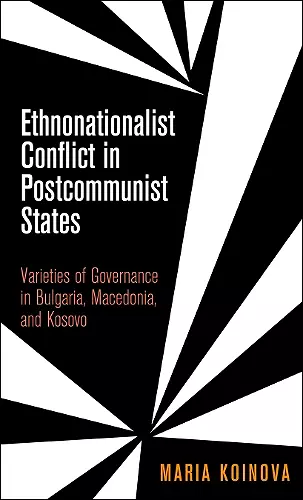Ethnonationalist Conflict in Postcommunist States
Varieties of Governance in Bulgaria, Macedonia, and Kosovo
Format:Hardback
Publisher:University of Pennsylvania Press
Published:4th Jul '13
Currently unavailable, and unfortunately no date known when it will be back

Tracing the development of informally institutionalized conflict dynamics in Bulgaria, Macedonia, and Kosovo, Maria Koinova analyzes why some conflicts were resolved with minimal violence after the end of communism and others broke out into civil war.
Ethnonationalist Conflict in Postcommunist States investigates why some Eastern European states transitioned to new forms of governance with minimal violence while others broke into civil war. In Bulgaria, the Turkish minority was subjected to coerced assimilation and forced expulsion, but the nation ultimately negotiated peace through institutional channels. In Macedonia, periodic outbreaks of insurgent violence escalated to armed conflict. Kosovo's internal warfare culminated in NATO's controversial bombing campaign. In the twenty-first century, these conflicts were subdued, but violence continued to flare occasionally and impede durable conflict resolution.
In this comparative study, Maria Koinova applies historical institutionalism to conflict analysis, tracing ethnonationalist violence in postcommunist states to a volatile, formative period between 1987 and 1992. In this era of instability, the incidents that brought majorities and minorities into dispute had a profound impact and a cumulative effect, as did the interventions of international agents and kin states. Whether the conflicts initially evolved in peaceful or violent ways, the dynamics of their disputes became self-perpetuating and informally institutionalized. Thus, external policies or interventions could affect only minimal change, and the impact of international agents subsided over time. Regardless of the constitutions, laws, and injunctions, majorities, minorities, international agents, and kin states continue to act in accord with the logic of informally institutionalized conflict dynamics.
Koinova analyzes the development of those dynamics in Bulgaria, Macedonia, and Kosovo, drawing on theories of democratization, international intervention, and path-dependence as well as interviews and extensive fieldwork. The result is a compelling account of the underlying causal mechanisms of conflict perpetuation and change that will shed light on broader patterns of ethnic violence.
"Koinova . . . is interested in why ethnonationalist conflicts vary in the level of violence they generate, why violence at whatever level persists, and when and why things change for the better or the worse. To get at the answers, she explores three cases, similar in their characteristics but different in their outcomes: Bulgaria (where majority-minority conflict has been free of violence), Kosovo (where it has not), and Macedonia (somewhere in between). Elaborate but lucid theorizing informs her explanations." * Foreign Affairs *
"The book is innovative because it provides an alternative way of theorising governance of majority-minority relations and it opens up new thinking about EU enlargement into the post- communist Western Balkans." * Political Studies Review *
"A conceptually sophisticated and empirically rich study. . . . Koinova uses comparative case studies of Bulgarian, Macedonian and Serbian policies toward Kosovo to explore the level and duration of violence among groups. Internal conflict dynamics are critical, especially interactions between ethnic majorities and minorities in the final days of communist rule. Sequencing is also important, making outcomes contingent and dependent on agency. Koinova's excellent book is an essential read for anyone interested in the Balkans, ethnic conflict and the study of politics more generally." * Richard Ned Lebow, King's College London *
"In this nicely written and richly conceptualized comparative study, Maria Koinova compellingly argues that periods of "critical juncture"
ISBN: 9780812245226
Dimensions: unknown
Weight: unknown
328 pages